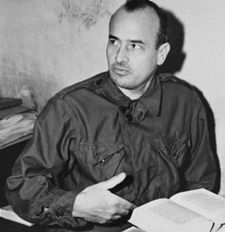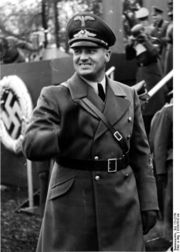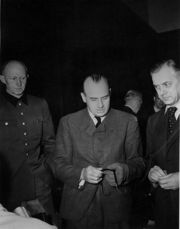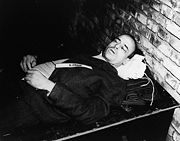Hans Frank
| Hans Frank | |
 Hans Frank as a defendant before the International Military Tribunal. |
|
|
|
|
|---|---|
| In office October 26, 1939 – January 1945 |
|
|
|
|
| Born | May 23, 1900 Karlsruhe, Baden, Germany |
| Died | October 16, 1946 (aged 46) Nuremberg, Germany |
| Nationality | German |
| Political party | National Socialist German Workers' Party (NSDAP) |
| Spouse(s) | Brigitte Herbst (married 1925) |
Hans Michael Frank (May 23, 1900 – October 16, 1946) was a German lawyer who worked for the Nazi party during the 1920s and 1930s and later became a high-ranking official in Nazi Germany. He was prosecuted during the Nuremberg trials for his role in perpetrating the Holocaust during his tenure as the Governor-General of that portion of occupied Poland that was not incorporated into the Reich, although administered by the Nazis, and known as the General Government. He was found guilty of war crimes and crimes against humanity and executed on October 16, 1946.
Contents |
Pre-war career
Frank was born in Karlsruhe, and his parents were Karl Frank, a lawyer, and his wife Magdalena (née Buchmaier). He had an elder brother, Karl Jr., and a younger sister, Elisabeth. He joined the German army in 1917, during World War I. After the war he served in the Freikorps under the command of Franz Ritter von Epp, and then joined the German Worker's Party (which soon evolved into NSDAP), in 1919, and was one of the party's earliest members.
He studied law, passing the final state examination in 1926, and rose to become Adolf Hitler's personal legal adviser. In this capacity he was privy to personal details of Hitler's life. In his memoirs, written shortly before his execution, Frank made the sensational claim that he had investigated Hitler's family in 1930 after a "blackmail letter" had been received from Hitler's nephew, William Patrick Hitler, who allegedly threatened to reveal embarrassing facts about his uncle's ancestry. Frank claimed to have uncovered evidence that Maria Schicklgruber, Hitler's paternal grandmother, had been working as a cook in the household of a Jewish family named Leopold Frankenberger before she gave birth to Hitler's father, Alois, out of wedlock. According to Frank, Hitler told him that his grandmother had merely extorted money from Frankenberger by threatening to claim his paternity of her illegitimate child. Frank accepted this explanation, but added that it was still just possible that Hitler had some Jewish ancestry. Nevertheless, he thought it unlikely because, "from his entire demeanor, the fact that Adolf Hitler had no Jewish blood coursing through his veins seems so clearly evident that nothing more need be said on this."[1] No evidence has ever emerged to support Frank's claims.[2]
As the Nazis rose to power, Frank served as the party's lawyer, representing it in over 2,400 cases, and spending over $10,000. This sometimes brought him into conflict with other lawyers, and one, a former teacher of Frank's appealed to him: "I beg you to leave these people alone! No good will come of it! Political movements that begin in the criminal courts will end in the criminal courts!"[3]
He was elected to the Reichstag in 1930, and in 1933 he was made Minister of Justice for Bavaria. He was also the head of the National Socialist Jurists Association and President of the Academy of German Law from 1933. Frank objected to extrajudicial killings,[4] both at the Dachau concentration camp and during the Night of the Long Knives.
However, Frank's view of what the judicial process required should not be exaggerated:
| “ | [The judge's] role is to safeguard the concrete order of the racial community, to eliminate dangerous elements, to prosecute all acts harmful to the community, and to arbitrate in disagreements between members of the community. The National Socialist ideology, especially as expressed in the Party programme and in the speeches of our Leader, is the basis for interpreting legal sources.[5] | ” |
From 1934, Frank was Reich Minister Without Portfolio.
Wartime career

In September 1939 Frank was assigned as Chief of Administration to Gerd von Rundstedt in the General Government (GG). From October 26, 1939, following the invasion of Poland, Frank was the Governor-General of the occupied Polish territories (Generalgouverneur für die besetzten polnischen Gebiete), controlling the area of Poland not directly incorporated into Germany (roughly 90,000 km² out of the 187,000 km² Germany had gained). He was granted the SS rank of Obergruppenführer.
One of his first operations was the AB Action, aimed at destroying Polish culture, and in which more than 30,000 Poles (intellectuals and the upper classes) were arrested and 7,000 were subsequently masacred. Frank oversaw the segregation of the Jews into ghettos and the use of Polish civilians as "forced and compulsory" labour. In 1942 he lost his positions of authority outside the GG after annoying Hitler with a series of speeches in Berlin, Vienna, Heidelberg, and Munich and also as part of a power struggle with Friedrich Wilhelm Krüger, the State Secretary for Security — head of the SS and the police in the GG. Krüger himself was ultimately replaced with Wilhelm Koppe.
An assassination attempt by Polish Secret State on January 29/30, 1944 (night preceding 11th anniversary of appointment of Adolf Hitler as Chancellor of Germany) in Szarów near Krakow failed. Special train with Frank traveling to Lviv was derailed after an explosive device went off but no one was killed.[6][7]
Frank later claimed that the extermination of Jews was entirely controlled by Heinrich Himmler and the SS and that he, Frank, was unaware of the extermination camps in the GG until early in 1944. During his testimony at Nuremberg, Frank claimed he submitted resignation requests to Hitler on 14 occasions, but Hitler would not allow him to resign. Frank fled GG in January 1945, in advance of the Soviet Army.
Chess
Hans Frank was extremely interested in chess. He not only possessed an extensive library of chess literature but was also a good player, and he even received the Ukrainian chess grandmaster Efim Bogoljubow at the Wawel castle. He was a patron of General Government chess tournaments (1940–1944). On 3 November 1940 he organized a chess congress in Krakow. Six months later he announced the establishment of a chess school under Bogoljubow and the World Chess Champion, Dr. Alexander Alekhine, and he visited a chess tournament in October 1942 at the "Literary Café" in Cracow.[8]
Capture and trial

Frank was captured by American troops on May 3, 1945, at Tegernsee in southern Bavaria. Upon his capture, he tried to cut his own throat; two days later, he lacerated his left arm while attempting to slit his wrists in a second unsuccessful suicide attempt. He was indicted for war crimes and tried before the International Military Tribunal in Nuremberg from November 20, 1945 to October 1, 1946. During the trial he renewed the faith of his childhood, Roman Catholicism, and claimed to have a series of religious experiences.
Frank voluntarily surrendered 43 volumes of his personal diaries to the Allies, which were then used against him as evidence of his guilt. Frank confessed to some of the charges put against him and viewed his own execution as a form of atonement for his sins. Although on the witness stand he expressed remorse, during the trial, he vacillated between penitence for his crimes and blaming the Allies, especially the Soviets, for an equal share of wartime atrocities.

The former Governor-General of Poland was found guilty of war crimes and crimes against humanity on October 1, 1946, and was sentenced to death by hanging. While awaiting execution, he wrote his memoirs. The sentence was carried out on October 16 by Master Sergeant John C. Woods. Journalist Howard K. Smith wrote of the execution:
| “ | Hans Frank was next in the parade of death. He was the only one of the condemned to enter the chamber with a smile on his countenance. And, although nervous and swallowing frequently, this man, who was converted to Roman Catholicism after his arrest, gave the appearance of being relieved at the prospect of atoning for his evil deeds.[9] | ” |
He and Albert Speer were the only defendants to show any true remorse for their war crimes during World War II.[10] "My conscience does not allow me simply to throw the responsibility simply on minor people... A thousand years will pass and still Germany's guilt will not have been erased."[11]
He answered to his name quietly and when asked for any last statement, he replied "I am thankful for the kind treatment during my captivity and I ask God to accept me with mercy."[9]
Family
On April 2, 1925 Frank married 29-year-old secretary Brigitte Herbst (1895–1959) from Forst (Lausitz). The wedding took place in Munich and the couple honeymooned in Venetia. Hans and Brigitte Frank had five children:
- Sigrid Frank (born March 13, 1927 in Munich)
- Norman Frank (born June 3, 1928 in Munich)
- Brigitte Frank (born January 13, 1935 in Munich)
- Michael Frank (born February 15, 1937 in Munich)
- Niklas Frank (born March 9, 1939 in Munich)
Brigitte Frank had a reputation for having a more dominant personality than her husband, and from 1939 she called herself "a queen of Poland" ("Königin von Polen"). The marriage was unhappy and became colder from year to year. When Frank sought a divorce in 1942, Brigitte gave everything to save their marriage in order to remain the "First Lady in the General Government". One of her most famous comments was "I'd rather be widowed than divorced from a Reichsminister!" Frank answered: "So you are my deadly enemy!"[12]
In 1987, Niklas Frank wrote a book about his father, Der Vater: Eine Abrechnung ("The Father: A Settling of Accounts"), which was published in English in 1991 as In the Shadow of the Reich. The book, which was serialized in the magazine Stern, resulted in controversy in Germany because of the scathing way in which the younger Frank depicted his father, referring to him as "a slime-hole of a Hitler fanatic" and questioning his remorse before his execution.[13]
Quotations
In a 1940 interview in the Völkischer Beobachter:
| “ | In Prague, big red posters were put up on which one could read that seven Czechs had been shot today. I said to myself, 'If I had to put up a poster for every seven Poles shot, the forests of Poland would not be sufficient to manufacture the paper.' [14] | ” |
About Polish partisans in Warsaw in 1943, he spoke from Kraków, stating:
| “ | If not for Warsaw in the General Government, we wouldn't have 4/5 of our current problems on that territory. Warsaw was and will be the center of chaos and a place from which opposition spreads throughout the rest of the country. | ” |
.
Portrayal in the media
Hans Frank has been portrayed by the following actors in film, television and theater productions.[15]
- Hans Schwarz Jr. in the 1954 West German film Geld aus der Luft
- Voja Miric in the 1971 Yugoslavian television production Nirnberski epilog
- Jerzy Duszyński in the 1976 Polish film Ocalić miasto
- John Bailey in the 1978 United States television production Holocaust
- Robert Austin in the 1984 United States television production Pope John Paul II
- Frank Moore in the 2000 Canadian/U.S. T.V. production Nuremberg
- Matt Craven in the 2005 Polish television production Karol, un uomo diventato Papa
- Andreas Conrad in the 2005 German T.V. miniseries Speer und Er.
- Harald Posch in the 2005 Italian/U.S./Polish television production Pope John Paul II
References
- ↑ Dieter Schenk, Frank: Hitlers Kronjurist und General-Gouverneur, 2006, p.65. ISBN 978-3100735621: "Dass Adolf Hitler bestimmt kein Judenblut in den Adern hatte, scheint mir aus seiner ganzen Art dermaßen eklatant bewiesen, dass es keines weiteren Wortes bedarf," (p.330 of Frank's memoirs published in 1953 as Im Angesicht des Galgens. Deutung Hitlers und seiner Zeit aufgrund eigener Erlebnisse und Erkenntnisse).
- ↑ Rosenbaum, R. (1998). Explaining Hitler: The Search for the Origins of his Evil, Macmillan, pp.16-36. ISBN 978-0679431510
- ↑ Evans, Richard J. (2004). The Coming of the Third Reich. Penguin Press, p. 179. ISBN 978-1594200045.
- ↑ See Martyn Housden, Hans Frank's Opposition to the SS: Social Behavior, Consistency and the Power of the Situation, University of Bradford.
- ↑ Quoted in Evans, Richard J. (2005). The Third Reich in Power. Penguin Press, p. 73. ISBN 978-1594200748
- ↑ Wroński, T. (1974). Kronika okupowanego Krakowa. Wydawnictwo Literackie, p. 320.
- ↑ Dąbrowa-Kostka, S. (1972). W okupowanym Krakowie. Wydawnictwo Ministerstwa Obrony Narodowej, pp. 160-167.
- ↑ Hans Frank and Chess - Edward Winter
- ↑ 9.0 9.1 See Smith, "The Execution of Nazi War Criminals"
- ↑ Gilbert, G.M. (1995). Nuremberg Diary. De Capo Press, pg. 19. ISBN 978-0306806612
- ↑ From the transcript of his cross-examination during his trial. See Testimony of Frank at Nuremberg
- ↑ "Hans Frank - Pre-war career, Wartime career, Quotation, Fiction and film," in Cambridge Encyclopedia, Vol. 32. Retrieved 20 January 2008.
- ↑ See Frank, Niklas (1991). In the Shadow of the Reich. Knopf. ISBN 978-0394583457. See also Susan Benesch's Review in Washington Monthly, Nov. 1991.
- ↑ Date of publication was June 6, 1940. Cited in Davies, N. (2003) Rising '44. Macmillan, London. p.84 ISBN 978-0333905685. A slightly different translation is given by Czapski, J. (1987). The Inhuman Land. London: Polish Cultural Foundation, p.306. ISBN 978-0850651645: The occasion was a widely distributed proclamation in Czechoslovakia announcing the execution of seven Czech students. This is what he said: 'If I had to order a distribution of posters announcing such an event every time I order a shooting of seven Poles, there would not be enough trees in the Polish forests to supply the necessary paper.'
- ↑ "Hans Frank (Character)". IMDb.com. http://www.imdb.com/character/ch0062614/. Retrieved June 1, 2008.
External links
|
|||||||||||||||||
|
|||||||||||||||||||||||||||||||||||||||||||||||||||||||||||||||||||||||||||||||||||||||
|
||||||||||||||||||||||||||||||||||||||